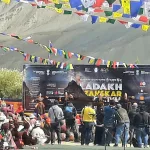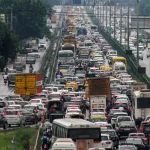International Labour Organisation study shows that “while women represent 50 percent of the world adult population and a third of the official labour force they perform nearly two-third of all working house, receive a tenth of world income and own less than one percent of world property.”Therefore, reservation for women is not a bounty but only an honest recognition of their contribution to social development.
Women’s Reservation Bill being tabled after 25 years – a constitutional amendment proposing that 33 per cent of seats in India’s central and state assemblies be reserved for women. It was first introduced to the Indian Parliament in 1996. The representation of women in different legislative bodies remains low across India.
India ranks 148 out of 193 countries in the number of elected female representatives in parliament, with Afghanistan ranking 71st, Bangladesh 111th, Bhutan 145th, Nepal 47th and Pakistan 116th. While the global average for female representation in lower chambers or unicameral is 25.8 per cent, India stands at around 14.7 %. The 78 (out of 543 members) women elected to the lower chamber elected in 2019 is India’s highest proportion to date.
Women make up 11.2 per cent, or 27 out of 241 members, of the upper chamber. But despite those dismal figures, the debate over the Bill has not featured prominently in national political discourse barring occasions like International Women’s Day.
First introduced in 1996, the Bill aimed to reserve 33 per cent of state assembly and parliamentary seats for women. It also proposed allocating one third of the seats reserved for Scheduled Castes and Scheduled Tribes in the lower chamber, Lok Sabha, and state assemblies, to women. The reserved seats would be allocated to different constituencies in Lok Sabha by rotation.
The Bill was inspired by the 73rd and 74th constitutional amendments in the year 1993. These amendments mandated that no less than one third of the total seats in local bodies be reserved for women. The Bill faced heated opposition, with critics claiming it diverted attention from more pressing electoral reforms. Others argued it would reduce the incentive for MPs deemed ineligible for re-election to do constituency work. Some even questioned the merit of women merit entering through the seat reservation system.
The Indian Constitution guarantees men and women equal ability to participate in elections. Gender-balanced cabinets are an important indicator of the commitment to achieving gender equality. There are also instrumental gains to be achieved through greater representation of women in decision making positions.The positive effect of female representation in local bodies can be seen across different domains.
First, the gender gap in villages with leadership positions reserved for women was found to be smaller than in villages without seat reservations. Second, female political representation correlates positively with female reporting of crime. Third, villages with female leaders tend to receive investment in drinking water. Fourth, female presidents of village councils enable other women to secure greater property rights progress that is key to reducing gender inequality in India.
But the positive impact of female political participation is not limited to villages. A United Nations University study found that women legislators raised the annual economic performance of their constituencies by 1.8 percentage points more than their male counterparts. The same study suggested that women legislators are less likely to exploit office for personal gain than their male counterparts. Female representation in state legislatures has also been associated with a reduction in neonatal mortality, suggesting that female political representation is an underutilised tool for addressing problems.
Despite the positive effects of female political representation, a lack of political spine has made it difficult to pass the Bill after first being introduced in 1996. It was reintroduced in 1998, 1999 and 2008, but despite passing in the Rajya Sabha in March 2010, it took 13 years to get voted on in the Lok Sabha (20 September 2023). Every political party for the last many years has been assuring its support to the Bill which disarms women activists. And then a farce rather than a tragedy is played out by so-called radical politicians, jumping into the well of the House, tearing copies of the Bill and making impossible for proceedings to continue-the House gets adjourned, the Bill is thrown into the dustbin till it is revived in subsequent years with the same result. The Bill finally lapsed following the dissolution of the lower house in 2014.
During the rule of the United Progressive Alliance, the Bharatiya Janata Party (BJP) opposition frequently accused the ruling Indian National Congress of getting cold feet over passing the Bill. But the tables have turned under the rule of the BJP, as they have relentlessly supported gender equality. Current female representation in state assemblies is similarly poor, with the proportion of female candidates increasing by five to ten per cent in the last three decades. At this rate, there is still a long road ahead for equal representation in India’s legislative bodies.
The continued under representation of women in politics is a reprehensible state of affairs for the world’s largest democracy. The lack of consensus among political parties regarding the contents of the Bill has hindered its passing, while the inadequate representation and participation of women casts doubt on the legitimacy of the policymaking process.
Reserving enough parliamentary seats for women is necessary for India to achieve proper political representation and live up to the full spirit of democracy. While a seat reservation system is no panacea for the deeply rooted gender discrimination in Indian society, passing the Women’s Reservation Bill is still a step towards achieving gender equality.
(The Author is a Researcher and can be reached at : [email protected] Twitter Handle: @agasyedmuntazir)





